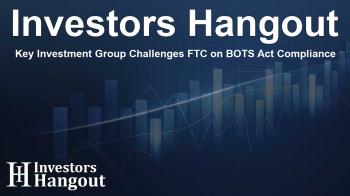Key Investment Group Challenges FTC on BOTS Act Compliance

Key Investment Group Takes Legal Stand Against FTC
Key Investment Group (KIG), a prominent player in the secondary market ticketing space, is making headlines by filing a lawsuit against the Federal Trade Commission (FTC). This action stems from disagreements regarding the application of the BOTS Act, a statute designed to protect consumers from unfair ticket-buying practices. The FTC alleged that KIG and similar entities violated this act by using multiple accounts to purchase tickets, claiming this practice undermines fair access to tickets for consumers.
Understanding the BOTS Act
The BOTS Act, or Better Online Ticket Sales Act, was established to curb the negative impact of ticket bots, which are automated tools that buy up large quantities of tickets before fan access. The purpose of this law is to ensure that genuine fans can secure tickets for events without unfair competition from automated systems. KIG contends that their business practices comply fully with the law and argue that the FTC's interpretation misrepresents what the act was intended to achieve.
Importance of Transparency and Fair Competition
According to a representative from KIG, the secondary ticketing market plays a crucial role in maintaining a balance in the live events ecosystem. They highlight that a significant number of concert tickets are sold for less than $50, indicating a vibrant market that allows for flexibility and access. The lawsuit emphasizes the need for fair competition within this space, ensuring that fans have a genuine opportunity to purchase tickets at reasonable prices.
Economic Impact of the Secondary Ticket Market
Estimates suggest that the secondary ticket market may exceed $10 billion soon, reflecting substantial consumer interest and market activity. Recent initiatives aimed at enforcing the BOTS Act have raised concerns among ticketing companies. KIG acknowledges the importance of regulating the market but believes the FTC's approach is excessively broad, which could dismantle not only their operations but also that of numerous small, local businesses serving ticket buyers.
The Future of Ticket Purchasing
As the lawsuit unfolds, consumers are left wondering how these developments will influence their ticket-buying experiences. KIG asserts that consumers prefer buying tickets from reputable secondary markets that understand their preferences and can provide tailored service. The FTC's current stance, if enforced, could limit these options and hinder local businesses.
Advocacy for Fair Practices
KIG champions a well-regulated secondary market that empowers fans. They are dedicated to advocating for practices that enhance consumer access while maintaining healthy competition in ticket sales. The company believes that punishing lawful practices under the guise of regulation could lead to long-term harm to consumers and a decrease in options available in the marketplace.
As KIG prepares to stand trial to defend its business model against the FTC's claims, the outcome of this lawsuit could reshape the landscape of secondary ticket sales and consumer rights in the industry.
Frequently Asked Questions
What is the BOTS Act, and why is it important?
The BOTS Act is legislation aimed at preventing automated systems from unfairly buying large quantities of tickets, ensuring fair access for consumers.
Why is Key Investment Group suing the FTC?
KIG is suing the FTC because it believes the commission's interpretation of the BOTS Act misrepresents legal ticket purchasing practices and threatens their business.
How does the secondary ticket market operate?
The secondary ticket market allows individuals and businesses to resell tickets, providing flexibility and options for consumers who missed out on initial sales.
What is the projected value of the secondary ticket market?
The secondary ticket market is expected to exceed $10 billion shortly, indicating its significant role in the events economy.
What are the potential implications of the lawsuit?
The outcome of the lawsuit could affect regulations within the ticketing industry and determine how companies can operate in the future.
About The Author
Contact Evelyn Baker privately here. Or send an email with ATTN: Evelyn Baker as the subject to contact@investorshangout.com.
About Investors Hangout
Investors Hangout is a leading online stock forum for financial discussion and learning, offering a wide range of free tools and resources. It draws in traders of all levels, who exchange market knowledge, investigate trading tactics, and keep an eye on industry developments in real time. Featuring financial articles, stock message boards, quotes, charts, company profiles, and live news updates. Through cooperative learning and a wealth of informational resources, it helps users from novices creating their first portfolios to experts honing their techniques. Join Investors Hangout today: https://investorshangout.com/
The content of this article is based on factual, publicly available information and does not represent legal, financial, or investment advice. Investors Hangout does not offer financial advice, and the author is not a licensed financial advisor. Consult a qualified advisor before making any financial or investment decisions based on this article. This article should not be considered advice to purchase, sell, or hold any securities or other investments. If any of the material provided here is inaccurate, please contact us for corrections.

